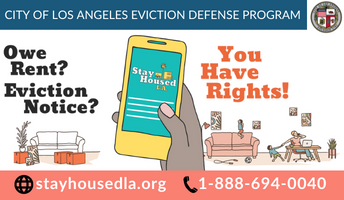
Under the Rent Stabilization Ordinance (RSO), a landlord is only required to pay monetary relocation assistance payments to tenants being evicted through no fault of their own. Without a RSO cause, a tenancy may not be terminated. There are 7 no-fault reasons under the RSO in which a landlord can legally evict a tenant. For each reason, landlords must file a landlord declaration application with the Los Angeles Housing Department (LAHD) before issuing a notice to move-out. The following eviction reasons require the payment of relocation assistance:
The landlord evicts for their own occupancy, a resident manager, or for the landlord’s spouse, children, grandchildren, parents or grandparents. Landlords must file a Declaration of Intent to Evict for Landlord Occupancy or Declaration of Intent for Owner/Family Occupancy or Declaration of Intent to Evict for Resident Manager;
Any tenant affected by Primary Renovation Work shall have the option to voluntarily terminate the tenancy in exchange for permanent relocation assistance as set forth in a Tenant Habitability Plan accepted by the LAHD;
The eviction is due to condominium conversion, demolition or the property is going to be permanently removed from the rental housing market (Ellis Act). Landlords must file Notice of Intent to Withdraw Units from Rental Housing Use;
The landlord evicts to comply with a governmental agency’s Order to Vacate. Landlords must file a Declaration of Intent to Evict in Order to Comply with a Government Agency’s Order;
The Secretary of the U.S. Department of Housing and Urban Development is both the owner and plaintiff and seeks to recover possession in order the vacate the property prior to the sale. Landlords must file Declaration of Intent to Evict From a HUD-Owned Property Prior to Sale;
The rental unit is in a Residential Hotel and the landlord is going to convert or demolish the unit(s); and
The Landlord seeks in good faith to recover possession of the rental unit to convert the property to an affordable housing accommodation. Landlords must file a Declaration of Intent to Evict to Convert to Affordable Housing Accommodation.
Determination of Relocation Assistance
The amount of relocation assistance depends on whether the tenant is an Eligible or Qualified tenant, the length of tenancy, and the tenant’s income.
Qualified tenant – A qualified tenant is any tenant who on the date of service of the written notice of termination is 62 years of age or older; handicapped, as defined in Section 50072 of the California Health and Safety Code, or disabled, as defined in Title 42 of the United States Code, Section 423; or who has one or more minor dependent children (as determined for federal income tax purposes).
Eligible tenant – Unless a tenant is a qualified tenant as explained above, the tenant is an eligible tenant and is entitled to receive a relocation assistance amount that depends on length of time in the unit and income.
Low Income Tenant – A tenant whose income is 80% or less of the Area Median Income, as adjusted for household size, as defined by the U.S. Department of Housing and Urban Development,regardless of the length of tenancy. HUD Income levels are located on Page 3 of the Relocation Assistance Bulletin.
A lower amount of relocation assistance is required for evictions for owner occupancy for “Mom and Pop” properties. “Mom and Pop” landlords may own no more than four residential units and a single-family house in the City of Los Angeles (LAMC 151.30 E). These landlords may pay a lower amount in order to evict for occupancy by the landlord, or the landlord’s spouse, children, parents, grandparents, or grandchildren. Use of this provision is limited to once every three years.
Appealing the Relocation Assistance Determination
A landlord or tenant may appeal the relocation assistance determination within 15 days of the issuance of the relocation assistance determination. Appeal reasons may include a tenant’s eligibility for higher levels of relocation assistance based on the tenant’s income, age, length of tenancy, family status or disability. There is a fee to file an appeal per rental unit to cover the administrative costs of the appeal hearing. There is a low income exemption waiver for the appeal fee. To qualify for an exemption from the appeal filing fee, the applicant’s annual household earnings must be no more than 50 percent of the median income in the Los Angeles area. If you do not qualify for an exemption, you must submit the filing fee before an appeal can be scheduled.
Tenant Relocation Assistance Program Fees
Program fees must be paid to LAHD by landlords seeking to evict tenants from RSO units for no-fault reasons, as well as landlords who issue a Notice to Terminate Tenancy for any rental unit in the City of Los Angeles for a condo conversion or demolition. Through the Tenant Relocation Assistance Program, the LAHD contracts with a relocation services consultant to assist displaced tenants in relocating to new housing. No-fault evictions in RSO units also require the filing of a Landlord Declaration of Intent to Evict with the LAHD.
Payment of Relocation Assistance
Relocation assistance payments must be made available to the tenant within 15 days of service of the written notice to terminate tenancy (move-out). Landlords may elect to pay the relocation assistance through an escrow account rather than provide the full relocation amount on the 15th day.
For current relocation assistance amounts, please view LAHD’s Relocation Assistance Bulletin.
— Last modified on Jan 30, 2023








